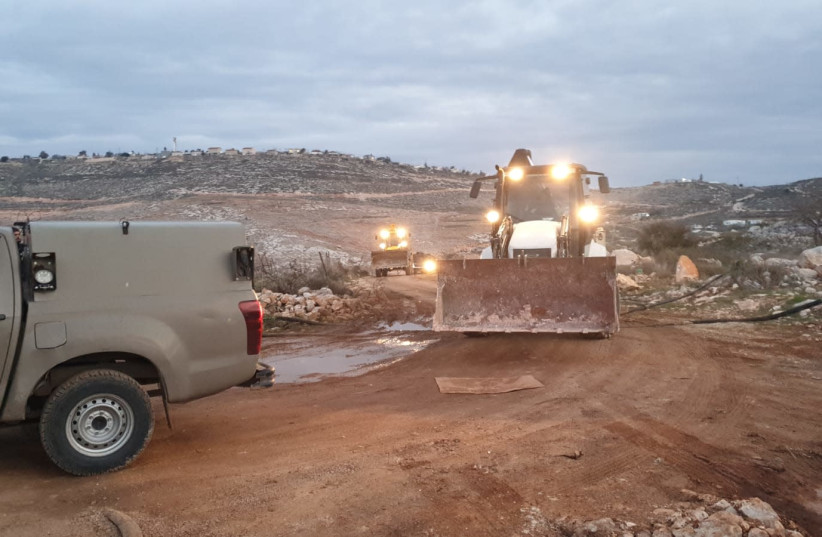By all accounts, it was a small and quiet community, one that consisted of young, idealistic pioneers infused with patriotic fervor and a love for the Land of Israel.
They had come to a hilltop dubbed Maoz Esther to build their homes and to serve as a buffer against illegal Palestinian construction that was encroaching on the nearby Israeli town of Kochav Hashahar in the northern Binyamin region.
But their dedication to Zionism and to the State of Israel was dealt a harsh and cruel blow this past week, when hundreds of Border Policemen stormed the site and proceeded to wreak havoc, leveling more than 20 structures, including two synagogues.
Five families that resided at Maoz Esther are now homeless, along with three others who lived in the adjacent community of A’ira Shahar, which was also demolished.
This senseless act of destruction, ostensibly carried out by Israeli authorities in the name of law and order, is in fact nothing less than ham-handed and heart-rending hypocrisy.

Consider the bitter irony with which a young man named Gilad Atia must contend. Atia, who serves at an IDF base in the south of the country, was a resident of Maoz Esther together with his young wife.
He was in uniform and on duty when he learned that the very same army to which he is giving three years of his life had just deprived him and his family of their home.
Speaking to Arutz Sheva, Atia’s pain and disbelief were palpable.
“I enlisted to protect my people, to give my service to the people, and to defend the country,” he said. “This morning, very large forces of police and army arrived to demolish our house on the hill of Maoz Esther. They came determined and with a lot of brutality, they threw out my wife and threw all our furniture and personal belongings out into the coming rain.”
“At the moment,” Atia said, “we have nowhere to live,” before adding, “I feel a bit strange that I came to defend my people and the country, and what I get is a kick in the face.”
MAOZ ESTHER was first established more than 15 years ago. It was named after Esther Galia, a mother of seven children who had been murdered by Palestinian terrorists in a drive-by shooting.
Local Palestinians claim the land is theirs, and the site has been forcibly evacuated by Israeli forces more than a dozen times over the years.
And this is precisely where the hypocrisy comes into play. As video evidence clearly indicates, Palestinians on the next hill over from Maoz Esther have been erecting structures illegally with impunity in an attempt to cut off and encircle Kochav Hashachar.
The government’s failure to take action against the illicit Palestinian construction is one of the factors that inspired the young pioneers of Maoz Esther, who wished to prevent the Palestinian plan from coming to fruition.
But instead of applying the law equally, without fear or favor, the IDF and the Civil Administration appear determined to use a much less-forgiving standard when it comes to Jews.
This latest outrage perpetrated against the Jews of Judea and Samaria comes at a time when the Defense Ministry is doing everything in its power to impose a de facto freeze on further Jewish construction in the area.
The Civil Administration’s Higher Planning Council, which is overseen by the ministry, has traditionally met four times a year to advance plans for new homes in Judea and Samaria. But the council has not convened since October 2021 and no date has been scheduled for its next meeting. The result is that new Jewish construction is essentially being frozen while still in the planning stage.
As a result, 14 leaders of Jewish communities in Judea and Samaria took the unusual step of canceling a meeting with Defense Minister Benny Gantz to protest the freeze.
Meanwhile, as a report issued by the Regavim organization in December revealed, the Palestinians have built nearly 6,000 illegal structures in Area C, which is under full Israeli control, in just the past two years. That averages out to seven new illicit buildings per day or about one every three hours.
There are now more than 72,000 illegal Palestinian structures in Judea and Samaria. But instead of taking determined action against them, the army this week chose to demolish Maoz Esther. In what kind of world does this make any sense?
Apparently, not all unauthorized construction was created equal.
It may be time for Israel’s right to adopt some of the tactics of the American left, and to undertake a campaign to rebrand Jewish outposts in Judea and Samaria as “undocumented communities.” Perhaps then they would be treated with the same kid-gloves as their Palestinian neighbors.
The writer served as deputy communications director under former prime minister Benjamin Netanyahu during his first term of office.
